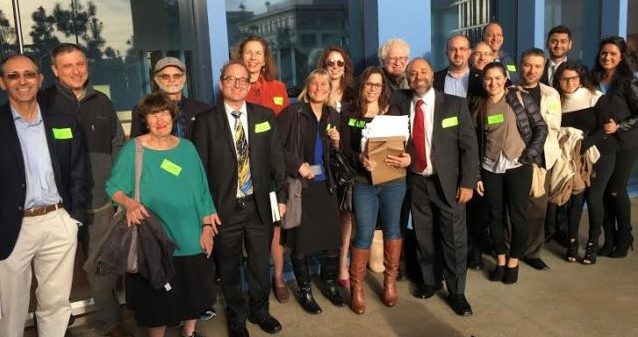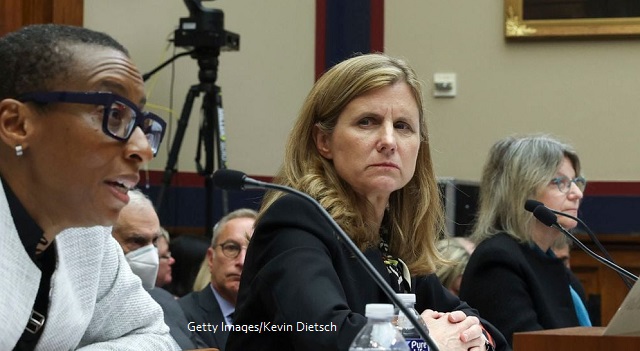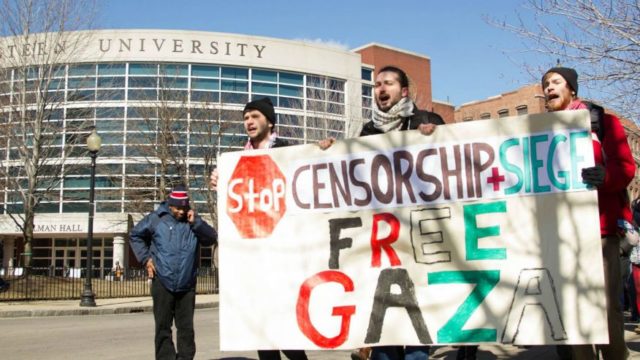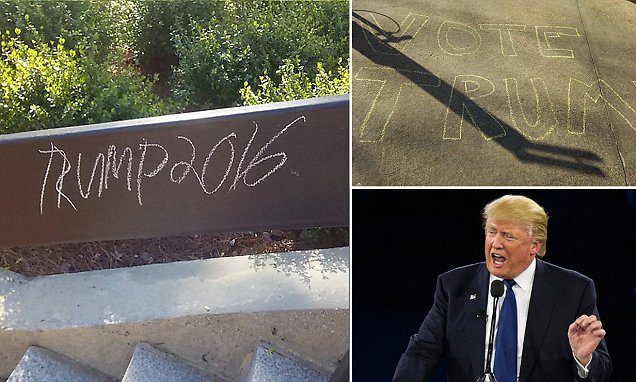Our review of the Americans for Peace and Tolerance documentary, Hates Spaces: The Politics of Intolerance on American Campuses raised the question of how extensive is the problem of the New Antisemitism. Moreover with the recent US abstention on UN Security Council adoption of Resolution 2334 how might the strident anti-Zionism messages exacerbate the problems of Anti-Israelism, Antisemitism and Boycott, Divestment and Sanctions on American university campuses.
We saw in our review of Hate Spaces that hate mongering of Israel and Jewish students has been fostered by Palestinian and Muslim Brotherhood groups connected to the US designated terrorist organization Hamas, Muslim Students Association (MSA) and Students for Justice in Palestine (SJP). They have been abetted by progressive academic associations and even anti-Zionist groups like Jewish Voice for Peace and J Street that alleges it is “pro-peace, pro-Israel.”
Moreover, administrations at many higher education institutions are caught in the dilemma of trying to prevent disruption and threats to Jewish and non-Jewish students by the abuse of traditional academic freedom and free speech standards. Further, as we shall see adoption of state and even federal standards of what constitutes Anti-Zionism as Anti-Semitism have failed to stop the atmosphere of intolerance on American campuses. That may result in draconian measures possibly violating Supreme Court rulings on so-called ‘protected speech’. This article will provide background that might determine how much worse the hostile environment could become for Jewish students on many American campuses and the seeming difficulty in the academy to alleviate it.
Spike in Israel Hate and Antisemitism across U.S. College Campuses
AMCHA Initiative, the leading NGO focused on campus Antisemitism, in a recent report identified more than 600 incidents at the top 100 American campuses; an increase of 45 percent over the same period in 2015. AMCHA was co-founded in 2011 by Tammi Rossman-Benjamin , a Hebrew Language lecturer at the University of California Santa Cruz and UCLA professor emeritus Leila Beckwith “ to investigate, document, educate about, and combat Antisemitism at institutions of higher education in the United States.” AMCHA, “Hebrew for ‘your people’, sought to adopt protocols for defining as discriminatory anti-Zionism as Antisemitism. The AMCHA report attributed this increase to:
The suppression of Jewish students’ freedom of speech and assembly doubled, while calls for Israel’s elimination tripled. The calls and acts opposing Israel’s right to exist were found to be highly correlated with behavior that targeted Jewish students for harm.
Underlying this spike in campus Antisemitic intolerance, she said was:
The presence of three factors — anti-Zionist student groups; faculty who support boycotts of Israel; and pro-Boycott, Divestment and Sanctions (BDS) activity — are “each strong predictors of anti-Jewish hostility.”
The target Rossman – Benjamin says is: “Jewish students …whether they actually support Israel or not. Their support is presumed just based on the fact that they are Jewish.”
The 50 Worst Universities for Jewish Students
A Brandeis University report released in October 2016 identified the top 50 American University “hotspots”. Among the top 10 were Brooklyn College of the City University of New York, Northwestern University, and the several University of California campuses at Irvine, Los Angeles, Berkeley and Davis. Here are examples of Israel hatred and Antisemitism cited by Jewish students:
Rutgers University in New Jersey
Members of the SJP “stood in front of the dining hall wearing white shirts with red ‘blood’ splattered across them. They had signs saying ‘this is what the Jews did to us.’ I felt extremely harassed; even though it was not personally directed at me, when I stood there I saw complete hatred that they had to all of the Jews walking by. There were even some people, a part of SJP, shouting profanities and giving the middle finger to the Jews that were just standing next to them.”
Northeastern University
A junior said campus life became “unsafe” when “a group on campus put eviction notices on the dorm room doors of Jewish people.” The incident, and others like it, was reported in the press to be the work of SJP members.
Ohio State
A woman student opened her door “to see my next-door neighbor drawing a swastika on my door.”
The special case of the University of California at Irvine
Perhaps the worst case of anti–Israel and Jewish hatred has occurred on the University of California at Irvine over the past decade. Unfortunately, it had been abetted by the former head of the local Orange County Jewish Federation. An affiliate foundation of the Federation financed a program called the Olive Tree Initiative that brought students in a supposed ‘accidental’ contact with a Hamas Palestinian legislative leader in 2009 in the west bank. Local Orange County Jewish community activists found themselves under attack creating counter marches during MSU Israeli Apartheid Awareness Weeks that featuring notoriously Antisemitic speakers like Malik Ali.
In February 2010, MSU students from both UC Irvine and UC Riverside disrupted a speech being given by former Israeli Ambassador to the US, Michael Oren. That brought charges by the Orange County District Attorney against 11 MSU members of heckling under California laws. The trial resulted in convictions of 10 MSU members and a year’s suspension by the university, subsequently reduced to one term.
Over the past six years we have written and interviewed Jewish students at UC Irvine regarding MSU/SJP disruption of campus Israeli Independence Day events. On May 18, 2016, another disruption by the SJP chapter, Jewish Voice for Peace and Black Student groups occurred at UC Irvine. They were objecting to a showing of an Israeli film, “Behind the Helmet” about IDF soldiers, two of whom were present, at an event sponsored by Students Supporting Israel. The SJP –led protesters blockaded the exit, verbally assaulted the audience with anti-Israel and Antisemitic epithets that required campus police to escort attendees from the SSI event. Chancellor Gilman released a statement condemning the SJP-led disruption:
A group of protesters reportedly disrupted the event, blocking exit paths. Participants feared for their safety, calling on our police force for assistance. While this university will protect freedom of speech, that right is not absolute. As I mentioned in a campus message at the beginning of the academic year (freespeech.uci.edu), threats, harassment, incitement and defamatory speech are not protected. We must shelter everyone’s right to speak freely – without fear or intimidation – and allow events to proceed without disruption and potential danger.
He referred the matter to the office of the Orange County District Attorney for review of campus police incident reports and statements of eyewitnesses that found no basis for criminal charges.
Notwithstanding in August 2016, the UC Irvine Office of Student Conduct found that the SJP chapter violated university policy. A Los Angeles Times August 18, 2016 report noted “university policy prohibits “obstruction or disruption of teaching, research, administration, disciplinary procedures or other university activities.” The SJP chapter at UC Irvine will be required to undertake a so-called “power meeting” on conduct of protests. An UC Irvine spokesperson Cathy Lawson said:
The program is designed to help SJP members “better understand how to host constructive events and protests if they want to protest and add to the conversation, rather than detract from it.” The written warning, she said, puts SJP on notice through March 2017 that its behavior is under increased scrutiny and that another violation could lead to harsher consequences.
Office of Student Conduct head Parham noted in an email: “We support and defend groups exercising free speech and assembly, yet we must protect everyone’s right to express themselves without disruption. This is a bedrock principle of our university.”

AMCHA coalition at the University of California Board of Regents, March 23, 2016.
So what’s being done about the problem?
On March 23, 2016, AMCHA co-founder, Tammi Rossman-Benjamin, backed by Jewish community leaders , was successful in having the Regents of the California University System adopt hate speech standards, specifically addressing the various forms of campus Antisemitism. Leaders and Representatives included AMCHA Initiative, Bruins for Israel, Iranian American Jewish Federation, Proclaiming Justice to the Nations, Simon Wiesenthal Center, StandWithUs, Students Supporting Israel at UCLA, Zionist Organization of America, UC Students, UC Professors, and concerned UC Alumni testified at the UC Regents Meeting. Rossman-Benjamin in a statement wrote:
The vote, with the inclusion of the condemnation of Antisemitic forms of anti-Zionism, represents a new direction in administration addressing modern Antisemitism. We are incredibly proud of this achievement. It was a challenging journey to arrive at this point, one that required the persistence of AMCHA, our extraordinary at-will coalition partners, students, activists, alumni and supporters.
The Board of Regents adopted an anti-discrimination protocol that included “anti-Zionism” such as BDS, as long as the matter was deemed “Antisemitic”.
The reality following this remarkable achievement in California was that the MSA and SJP were allowed to carry out their annual Israel Apartheid Awareness and anti-BDS campaigns on university system campuses, including the May 18, 2016 disruption at UC Irvine.
Swastika vandalism breaks out on campuses after Presidential Election
Following the electoral victory of Donald Trump there was a spike of Antisemitic Swastika vandalism on college campuses across America reported by The Algemeiner:
At Northwestern University in Illinois, two anti-Trump freshmen — one of them Jewish — spray-painted a swastika, images portraying genitals and anti-gay and racist slurs, alongside the president-elect’s name, on the wall of a non-denominational campus chapel.
At the University of Mississippi, a swastika was found in a residence hall elevator. According to a report in the student newspaper The Daily Mississippian, it was the “fourth instance [on campus] since Election Day.”
At the American University in Washington, DC, a swastika next to the phrase “Go Trump” was discovered on a classroom wall. According to the student newspaper The Eagle, students later modified it to look like an octagon, and changed the words to “Go Drumpf,” adding the words “peace” and “love” to the graffiti. The incident came on the heels of an anti-Trump protest on campus, during which students burned American flags.
At Franklin & Marshall College in Pennsylvania, a Star of David with a swastika drawn in its center was found in a classroom.
In Indiana, a swastika was discovered drawn on a dry erase board hanging outside of a dorm room door at Earlham College. “This act was completely reprehensible and totally unacceptable,” the school’s president said in a statement.
In Oregon, Reed College students found Antisemitic, racist and homophobic graffiti — such as a swastika surrounded by a circle alongside the phrase “White is right” — on the wall of a bathroom at the school’s library.
That prompted Aviva Slomish, International Campus Director for Boston-based Middle East Media watchdog CAMERA to call on university officials to “denounce these episodes and thoroughly investigate and punish the offenders.”
In early December 2016, a Rutgers Jewish student, Avi Kulich was interviewed by The Tab about the continuing threats on the New Jersey campus in the wake of this swastika vandalism. His comments underline the increasingly hostile campus environment towards Israel and Jews graphically portrayed in Hate Spaces:
Students for Justice for Palestine are pretty big on campus. And at virtually every left-wing protest Israel manages to get mentioned somehow.
I think they see Jews as both benefiting from white privilege and as complicit in so-called Palestinian ‘suffering.’ Most of this is based on misinformation and lies and they have no issue supporting groups like Hamas that expressly call for extermination of Jews.
People like to pretend they’re just ‘anti-Zionist’ and not ‘Antisemitic,’ but Israel is a Jewish state and Zionism is the effort to have a Jewish state in their ancestral homeland.
[…]
It’s blatant Antisemitic blood libel. Most anti-Israel rhetoric is tinged with Antisemitism.
Abusing Free Speech – the Dilemma Facing American Universities
On December 1, 2016, the US Senate unanimously passed the “Antisemitism Awareness Act”. Final passage of the companion House version awaits the start of the 115th Congress on January 3, 2017. The legislation “expands the Department of Education’s definition of Antisemitism to include problematic criticism that ‘demonizes’ and ‘delegitimizes’ Israel or applies a ‘double standard’ against the Jewish state.” The effort to rein in Antisemitic speech by Muslim Brotherhood affiliated groups on American campuses runs into existing Supreme Court rulings allowing protected speech under the 1969 ruling in the Brandenburg v State of Ohio matter involving a KKK leader. The dilemma that many university administrators face is barring campus protests that violate academic freedom and ‘protected speech’ standards. Barring disruption of free speech events and threatening physical harm are matters about which university administrations have established policies. However preserving free speech on campus some critics believe, as expressed in a recent Wall Street Journal exchange of letters, “shields campus free-speech intimidators.”
The trigger for the WSJ letters was a December 16, 2016, op-ed by UC Irvine Law School dean Erwin Chemeresky and Chancellor Robert Gilman, “A Bill to Police Campus Speech.” Their argument is that the changes in the definition of what constitutes Antisemitic campus speech runs afoul of First
Amendment ‘protected speech’. They concluded:
To put the point simply: Congress should not pass legislation that requires a government agency to monitor and respond to political speech—even if that speech ‘demonizes’ Israel or any other country.
We agree that the problem of anti-Semitism on campus and in society generally, is real and ought to be addressed. There are many steps colleges can take. They should ensure that Jewish and pro-Zionist students are included and that the proud expression of Jewish identity on campus is welcomed. Universities should make clear that attempts to disrupt events organized by Jewish or pro-Israel students will not be tolerated. Campus leaders should speak out against hateful speech, and they can react swiftly to any actual threats, harassment or destruction of property.
But the solution most despised by the Constitution is for Congress to pass a law that threatens universities and speakers merely because of the views being expressed. The Antisemitism Awareness Act is troubling because it seems to do precisely that.
One critical letter writer to the editor of the WSJ, pointed out that Dean Chemeresky had violated his own principal in the matter of a fee imposed on the campus Young Republican for bringing in anti-PC gadfly Milo Yiannopoulous alt-right speaker. That , the letter writer suggested violated the 1992 Supreme Court ruling in the Forsyth County case banning so-called “pay to speak” The argument being that “UC Irvine penalizes those who engage in speech.” Noting that Dean Chemeresky had defended the convicted MSU 10 students who “criminally disrupted” the speech of former Israeli Ambassador Michael Oren on campus at UC Irvine in 2010.
Conclusion:
Perhaps the answer lies in adopting federal standards regarding Antisemitic hate speech protocols modeled on that adopted by the Board of Regents of the University of California system. A more drastic step may be the adoption of legislation designating the Muslim Brotherhood affiliates in the U.S. as terrorist organizations. That in the opinion of some Trump advisers might stop the anti-Israel and Antisemitic activities of Muslim Brotherhood affiliates on college campuses.
The matter of addressing the Boycott, Divestment and Sanctions campaign against Israel was taken up in model state legislation developed by Professor Eugene Kontorovich of Northwestern University’s Pritzker School of Law and promoted by the Washington, DC –based Israel Allies Foundation. To date 14 states have passed the anti-BDS legislation, the latest being signed into law by Ohio Governor John Kasich. We will see if any of these initiatives come to fruition in 2017. In the meantime, the SJP is seeking to establish chapters at high schools across the country.
Parents of college students concerned about the potential spike in New Antisemitic incidents on American campuses might keep a watching brief by periodically checking with the AMCHA Initiative Antisemitism Tracker. Another useful source is the Algemeiner report on the 2016 40 worst American universities hostile to Jewish Students.






 In March we posted a political satire column titled “
In March we posted a political satire column titled “ It appears that political satire has become politically correct policy at DePaul University.
It appears that political satire has become politically correct policy at DePaul University. 
